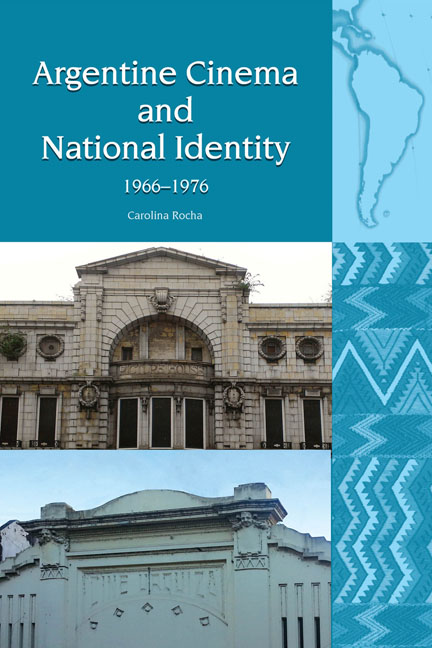Book contents
- Frontmatter
- In Memory of Paulina Piselli (1937–2017)
- Contents
- Acknowledgements
- Introduction
- Section I Argentine History and National Cinema, 1955–1976
- Section II The Cinematic Gauchesque
- 5 Martín Fierro
- 6 Don Segundo Sombra
- 7 Santos Vega
- 8 Juan Moreira
- 9 Los gauchos judíos
- Section III Representing Founding Fathers
- Conclusion
- Bibliography
- Index
7 - Santos Vega
from Section II - The Cinematic Gauchesque
- Frontmatter
- In Memory of Paulina Piselli (1937–2017)
- Contents
- Acknowledgements
- Introduction
- Section I Argentine History and National Cinema, 1955–1976
- Section II The Cinematic Gauchesque
- 5 Martín Fierro
- 6 Don Segundo Sombra
- 7 Santos Vega
- 8 Juan Moreira
- 9 Los gauchos judíos
- Section III Representing Founding Fathers
- Conclusion
- Bibliography
- Index
Summary
On July 22, 1971, Santos Vega, a film produced and directed by Carlos Borcosque, Jr., a 28-year-old former assistant director, was released in Buenos Aires. Two weeks before, it had been pre-released in the city of Bragado, where it was shot during March and April 1971. Like Don Segundo Sombra, the crew also included a historical advisor, but Santos Vega did not have financial support from the NIC, despite its ‘Argentine’ topic. Its total cost of 100 million pesos was similar to previous gauchesque films. Santos Vega was based on Arturo Pillado Matheu's adaptation of both Rafael Obligado's poem and Ricardo Gutiérrez's novel. The lead role was played by José Larralde (1937–), a singer of folk music who recorded his first album in 1967 and had enormous success with his concerts. Although Larralde had had offers for film work, this was his first cinematic role. He agreed to incarnate a singing gaucho because, in his opinion, Santos Vegas had ‘cosas que decir y cosas a las que servir’ [things to say and things to serve]. He also said, ‘me interesa que se salve la película en sí, pero que se salve para el país, para mostrarlo en el comienzo de su tradición’ [I am interested in saving the film for itself, in saving it for the country, to show it in the beginning of its tradition] (‘La vergüenza,’ 1971, 47). Santos Vega is thus a heritage film, characterized by a strong desire to represent a foundational past.
The film's reception differed from those of the two previous gauchesque films. J.H.S., reviewer for La prensa, pointed out that ‘el héroe legendario no está’ [the legendary hero is not there] (‘Santos,’ 1971, non. pag.). Similarly, Clarín's reviewer noted the one-dimensional characters: ‘No hay aquí personas de cuyas esencias y conductas se remitan a un desarrollo. Hay solo tipos fugazmente contactados’ [There are no characters whose essence and behaviors show development here. There are only loosely connected types] (‘Santos,’ 1971, non. pag.). J.C.F. listed technical flaws, such as an overreliance on zooms and the slow narrative rhythm (‘Santos,’ 1971, 59). Other problems identified were a weak script and poor performances from the supporting cast. Unlike Martín Fierro and Don Segundo Sombra, Santos Vega did not have success at the box office, nor did it receive any awards.
- Type
- Chapter
- Information
- Argentine Cinema and National Identity (1966–1976) , pp. 106 - 110Publisher: Liverpool University PressPrint publication year: 2018

